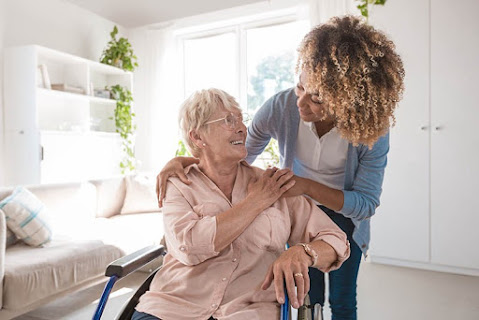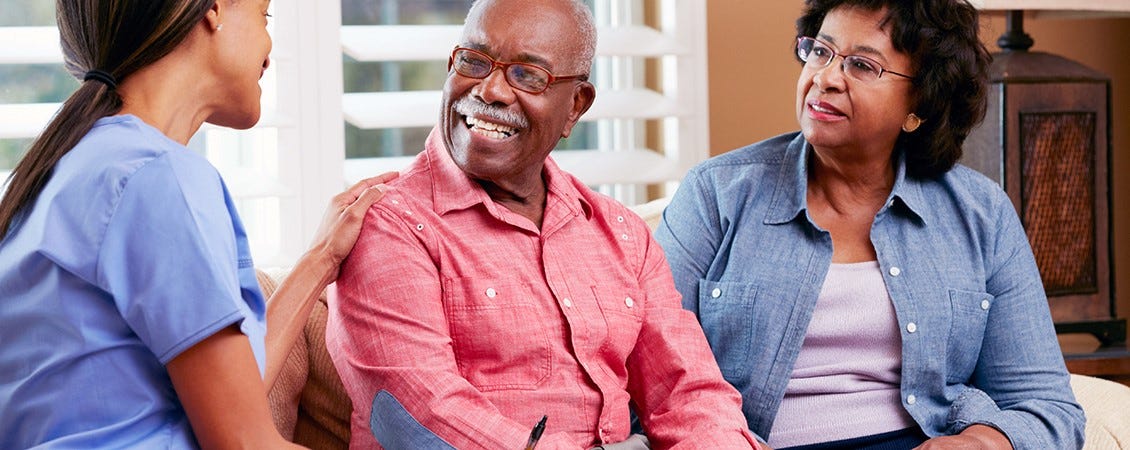Your senior loved one may have hearing loss, limited mobility, an inability to manage household chores, or health complications. It makes sense that as you work to arrange care, managing straightforward tasks is top of mind: hearing aids, a walker, help with dishes — check, check, check. These are essential tasks to achieve.
But many older people suffer from loneliness, depression, and isolation, too. Loneliness has been shown to precipitate declining health and can inhibit independence and mobility. That problem is not as easily solved. Loneliness can be an issue even for seniors who are not living alone. As you approach care options, there are multiple paths — primarily, task-centered care vs. person-centered professional caregiving — and it’s essential to consider the strengths, weaknesses, and outcomes in choosing a route for your loved one.
1. What is Task-Centered (or Task Management) Care?
Task-centered care is a social work practice frequently used in hospitals, nursing homes, and assisted-living facilities to accomplish measurable, specific goals quickly. A target condition is identified by a medical professional, along with steps to get there. For instance, in a hospital, the target might be discharge, and the steps would be the checklist to get there. A goal is accomplished, and the project is over.
A problem with task-centered care is that the person affected is often not even involved. A study by BMC Geriatrics of the effects of person-centered care notes the many problems with the task-centered model. Care Is “primarily granted and delivered based on physical and functional needs, while psychosocial needs and quality of life requirements (quality of life) have been given less priority [causing a] gap between needs and services, between expectations and experiences, which may lead to expressions of dissatisfaction.”
Furthermore, the study cites other findings that have demonstrated how “a trusting relationship between the older person and professional staff is essential to enable shared decision making to facilitate the older person’s autonomy and sense of being respected.”
The research also finds another major issue with task-centered care, particularly in nursing homes: keeping good staff. Citing many previous reports, the authors note that “when it comes to nursing home services, a growing crisis has been described with high turnover rates and challenges in recruiting and retaining skilled care professionals. In addition, employees have reported experiences of dissatisfaction and frustration with work, citing a stressful and hectic environment, increasing demands for efficiency, not having sufficient time to converse, provide the “little extras” and support in the psychosocial domain.”
But it doesn’t have to be this way, the authors say, and person-centered care is the solution:
“Other studies in aged care have shown positive results from implementing a person-centered approach. For example, a report that implemented person-centered care in rehabilitation treatment resulted in functional improvements and higher satisfaction. Also, […] increased involvement in care resulted in lower costs, higher physical function, and shorter stays in hospital after hip fractures [and] person-centered care of older people with dementia can prevent and reduce agitation and depression.”
2. The Importance of an Interpersonal Connection
While task-centered assistance can provide the absolute bare minimum of care your loved one needs, a professional caregiver offers that interpersonal connection that supplements task-centered aide essentially and exponentially. A professional caregiver offers holistic care to ensure the emotional and social needs of your loved one — needs that may not fall under task-centered care — are also met.
While the above study demonstrates the danger of isolation, it can be helpful to consider real anecdotes, too. For example: In the aftermath of a stroke, an 86-year-old Florida woman, who lived most of the year alone, began receiving regular visits from a physical therapist and a nurse to aid in her recovery. Her family — nearby and closely involved in her care — found peace of mind in having their experience on hand and were thankful for some reprieve.
While her family anticipated a boost in her physical health, they didn’t expect what ended up being the most significant benefit: her absolute joy in having the caregivers regularly visit and the resulting immediate improvement in her mental health. The aging woman recovering from a stroke relished the conversations she’d have during the visits, what they worked on, a funny thing about so-and-so. It was a social side of her that her family hadn’t seen in years. And — despite family members having tried everything to get her to do simple exercises — she eagerly performed these tasks for her caregivers. She wanted to do her best for these new people in her life, in the way that one puts forth even extra energy and effort at the beginning of a friendship or relationship.
She was happy to be forging new connections and not to feel so isolated. Within weeks, she walked with energy around the house and completed tasks she hadn’t handled by herself in years.
Not every instance will play out the same way, of course. That stroke was a wake-up call and her expeditious treatment allowed for a full recovery. But this is far from the only example of professional caregivers making a drastic difference in the lives of those they visit. The regularity of a visitor, the conversation, the company to anticipate, the “new friend” — these things can defeat loneliness and boost the quality (and length) of one’s life.
The National Institutes of Health cites several studies demonstrating the adverse effects of social isolation in older adults — and not just mentally or emotionally. Per the NIH:
“Social relationships are consistently associated with biomarkers of health. Positive indicators of social well-being may be associated with lower levels of interleukin-6 in otherwise healthy people. Interleukin-6 is an inflammatory factor implicated in age-related disorders such as Alzheimer’s disease, osteoporosis, rheumatoid arthritis, cardiovascular disease, and some forms of cancer. Social isolation constitutes a major risk factor for morbidity and mortality, especially in older adults” and “People who are lonely frequently have elevated systolic blood pressure.”
3. What Can a Professional Caregiver Do Differently?
Many older individuals are adamant about staying in their own homes. But as their health declines and the number of tasks they can no longer manage grows, the situation can become challenging. This is why many families turn to home health aides, who can help with grooming, household chores, exercise, taking medication, etc.
But in a much more universal way, a professional caregiver can help by keeping loneliness and depression at bay and providing bright spots in what tend to be otherwise long and empty days that stretch into weeks and months. At Visiting Angels Newton/Canton, Your loved one is matched with a caregiver they connect with, who they look forward to seeing. Their companion gives them energy, on top of the benefits inherent in being in their own home, which lets them maintain essential self-respect and a sense of agency in being involved in their care plan. In a nursing home or assisted living facility, task management care is the common practice; it’s about checklists, the dedicated interpersonal aspect that seniors need is almost always missing.
A professional caregiver goes beyond a measurable task. They are not shuffled room to room, marking charts and moving right along. Their presence is consistent and long-term; they become a reliable conversation partner, as well as an aid in health, well-being, and day-to-day needs.
Loneliness is a serious health issue, and the companionship of a professional caregiver — someone who is focused on the person, not another list of tasks — can help stave off the isolation that leads to loneliness and depression.
About Visiting Angels Newton/Canton
Visiting Angels Newton/Canton MA is an award-winning home care agency that has been providing high-caliber in-home care services for the elderly and people with disabilities for over seventeen years. Countless families have benefited from our at-home care, senior companion support, respite care, live-in and 24-hour assistance, dementia and Alzheimer’s care, transitional aid, and private duty care services in Natick, Wellesley, Dedham, Needham, Stoughton, Brookline, Canton, Watertown, Jamaica Plain, Newton, Norwood, Roslindale, Upper Back Bay, Westwood, and neighboring communities. The non-medical assistance provided by Visiting Angels Newton/Canton home care providers can make a significant impact on your loved one’s happiness and quality of life.

